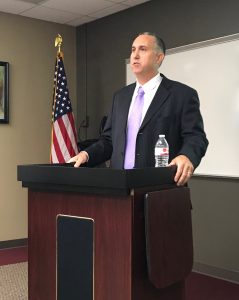Kendall State’s Attorney: Early childhood education helps keep crime down
By Erika Wurst For Chronicle Media — September 16, 2019
Kendall County State’s Attorney Eric Weis speaking at the Fox Valley United Way Early Childhood Summit on Sept. 12. (Photo by Erika Wurst/for Chronicle Media)
When Kendall County State’s Attorney Eric Weis heads down to Springfield to plead for money, he’s not asking for jailhouse upgrades, body cameras, or law enforcement initiatives.
Instead, his pleas are for a much different kind of cash flow, and one that’s unexpected from a man like himself.
When he goes to Springfield, Weis asks for early childhood education funding, which will not only help Kendall County children, but will help his own department in the long run.
Weis joined dozens of community educators, leaders, and stakeholders Sept. 12 at the Kendall County Health Department in Yorkville for the Fox Valley United Way Early Childhood Summit where the group discussed ways to close deficits impacting early childhood education and make learning opportunities available for all.
Good students, prepared students, eager students, often stay out of the court system, saving the state billions of dollars each year on prison and jail funding, he says.
Reaching out to help kids early — before children reach the age of 5 — can make a huge impact in seeing the numbers of those convicted wane.
In Kendall County, there are 10,861 children under the age of 5. By the time they reach kindergarten, 80 percent of those children will not be reaching standardized education benchmarks of kindergarten entry.
Knowing this, and the fact that 90 percent of a child’s brain develops in the first five years of life, it is crucial to engage young children in early childhood education programs to allow they the best chances of success, Weis said.
“It’s not like they’re not ready for a master degree level at Harvard,” Weis said. “It’s kindergarten. And we’re not talking about a small percent of students. It’s 80 percent and that’s not good. That should be a concern when we look at where we are sending our resources, and more importantly where we aren’t sending our resources.”
He told those local leaders present that he urges lawmakers to understand that if money isn’t spent on early education, it will be spent on the prison systems where failing students will likely end up.
“It cost much less to prevent the disease than it does to treat the disease,” Weis said. “We have to look locally in terms of putting collaborations together and funding together if we want to make differences in our local communities, and that’s what we need to do right now.







